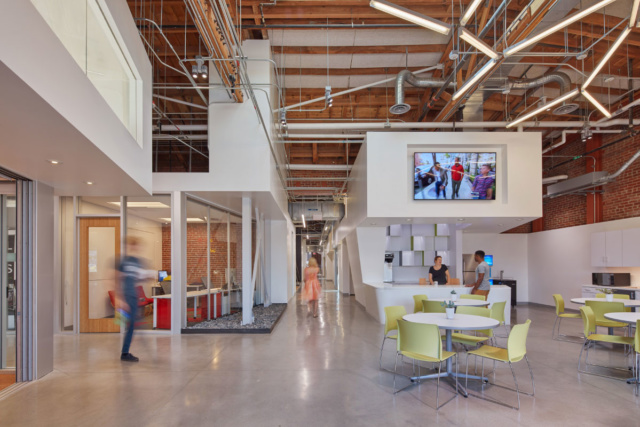
Meet the incubators and accelerators producing the new guard of design and architecture start-ups. This is part of a series profiling incubators and accelerators from our April 2018 Technology issue.
At the Los Angeles Cleantech Incubator (LACI), participating members get a lot of bang for their buck. Originally started in 2011, the outfit moved in 2016 into a 60,000-square-foot complex, known as the La Kretz Innovation Campus and owned by the Los Angeles Department of Water and Power. The campus is one of the inaugural public amenities of a new Cleantech Corridor planned by the City of Los Angeles for a vast area stretching from the Lincoln Heights neighborhood, in East L.A., to the Arts District, downtown.
The complex is made up of an adaptively reused and seismically retrofitted historic warehouse, among other components, designed by John Friedman Alice Kimm Architects. The mix of offices, labs, and makerspaces offers LACI’s portfolio of cleantech companies access to cutting-edge fabrication and prototyping tools. With six specialty labs, the LACI-managed Advanced Prototyping Center (APC), is also open to the public through memberships starting at $250, making more than $10 million in specialty equipment available to budding innovators and entrepreneurs. The innovation hub is being marketed by LACI as a one-stop shop for ambitious, tech-savvy groups and individuals looking to develop and test new industrial-scale ideas and products. The one-of-a-kind APC offers some of the most advanced, industrial-grade fabrication and research tools, as well, including professional-grade laser cutters, CNC mills, water jets, and even a full-blown biochemistry lab.

The facilities allowed the designers behind Hive Lighting to model, test, and fabricate prototypes of their high-performance, energy-efficient plasma and LED lights.
Kay Yang, APC director, explained, “This is where you come to get off the ground if you’re an L.A.-based start-up;” the incubator also boasts a new artist-in-residence program and a slate of professional advisers, who hold office hours, as well as mentorship for members. Yang added that, for certain participating companies, “LACI has cut 12 to 18 months off start-up times” while also allowing these groups to maintain full intellectual and copyright protections, part of LACI’s “intellectual property–neutral” setup.

According to LACI’s calculations, in the past six years, the incubator has helped 72 portfolio companies raise $165 million in start-up funding, generate $220 million in revenue, and create 1,700 jobs across the region.
Current portfolio companies include:
Advanced Vehicle Manufacturing
An all-electric bus manufacturer with goals to create 100 percent zero-emission transportation.
An all-electric airplane fabricator.
A cloud-based software-procurement platform.
A prefab home company based in California.
A touch-and-vision-based industrial robot manufacturer.
